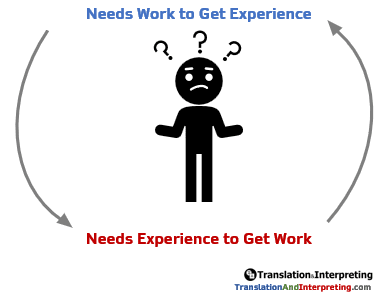It’s not rare for new translation and interpreting graduates to come across internship offers the moment they leave university. But are internships really a good way to enter the translation industry?
Entering the market as a new translation or interpreting graduate is noticeably hard. You’re now qualified and ready to start working, but soon you realise there’s little to no work coming in.
The infamous experience paradox almost always plays the role of the villain. Clients are reluctant to send you work because you’ve got no work experience, but that reluctance is precisely what prevents you from gaining experience in the first place.

One way to potentially overcome this hurdle is by looking for a job as a translation project manager – at least for a couple of years, so that you gain experience, professional connections and important knowledge about the industry from within. That’s the route I personally followed, and I’m glad I’ve done it that way.
However, it’s important to note not every agency is willing to offer a full time contract to new starters. If you don’t have any previous experience, they may only have internship positions available for you.
Note: While most interns are translation or interpreting studies graduates, some agencies are also willing to offer internships to people with other types of background who are willing to make a transition to the translation industry.
So in this post I’ll share my thoughts on translation internships. In the end, I’ll reveal whether – in my personal opinion – entering an internship programme is worth its while.
The Benefits Of Doing An Internship
Internships tend to be an important part of one’s academic training. University teaches you a number of important skills, but too often there’s a gap between these and the reality of the job market.
I jokingly like to say that university only teaches you how to pass exams. Most real work skills are often overlooked: you will learn those at a workplace, not in a classroom.
When you’re fresh from university, you are a high risk investment for potential employers and clients. While you may have proven your ability within a specific environment (i.e., university), that tells them nothing about your actual professional skills.

Even the best students tend to be highly unprepared for the job market the moment they complete their studies. The real learning process is yet to start.
That’s why internships can be so important. They give the applicant the chance to learn how to do the actual job while representing a much lower risk to the company.
A properly designed internship programme is almost always a win-win situation. In an ideal scenario, it’s in the company’s best interest to train the intern properly; good interns tend to become good employees, so in the end the company may decide to reward them with a contract.
And even you don’t stay in the same agency in which you’ve completed the internship, it will be easier for you to get work elsewhere from that point onward.
How Translation Internships Actually Work
This is where confusion tends to arise. That’s because new graduates often take the designation ‘translation internship‘ too literally – or let’s just say the designation is somewhat misleading when we consider the current market trend.
Let’s get this clear: a translation internship does not mean you will be translating anything. It almost never does these days.
What it normally means is that you’ll learn how to work for an agency as a translation project manager (PM.) That’s a completely different role from what many graduates have in mind at first.
It makes no sense for translation agencies to bring intern-translators on board, purely because most agencies no longer hire translators directly. Most of their direct employees are PMs.

The only internships in which you may work as an actual translator are those offered by companies with their own internal translation department. These are companies (in sectors such as retail, manufacturing, marketing, etc) that don’t rely on agencies to get their content translated; they are also rare to find these days.
There’s also institutional internships such as those run by the European Parliament (traineeships, as they’re called), which are available both for translators and interpreters. You’ll definitely be working on translation or interpretation if you take one of these.
Working as a PM rather than a translator or interpreter may sound disappointing to many. Nevertheless, I think the other way: it will give you an advantage over linguists who have never worked as PMs. A clear knowledge of how things work on the ‘other side’ will become a great asset when you later decide to go freelance.
Internships tend to last for up to 6 months and are a standard practice in many industries. There’s no reason why it should be different in ours.
What’s more, they’re one of the ways to potentially ‘break’ the experience paradox. And if after the internship you decide to work as a full time PM for a couple of years, more power to you.
Bad Internships vs Good Internships
Unfortunately, all internships aren’t made equal. More specifically, there are 2 main types of internship programmes. Allow me to be blunt and simply label them as ‘bad’ and ‘good’ internships.
Let’s start by the infamous bad internships. Some translation agencies make a point of creating internship positions in order to get cheap labour. It’s as simple as that.
These ‘bogus internships‘ aren’t designed to teach you anything. The intern is hired just to perform repetitive, menial tasks that may not require much of a brain to be carried out.

The company won’t care if you gain any valuable experience or knowledge. They just want certain tedious tasks done by someone without having to pay a proper salary.
On the other hand, a good internship is designed to teach the intern how to do the actual job.
Note that companies that offer good internships aren’t acting as a mere charities or being kind just because they want to be virtuous. They also have their best interests at heart.
Because PMing is a demanding job with a high level of labour turnover, they see interns as potential future full time employees.
This allows them to keep a steady flow of quality workers. By the time the internship is over, the company may decide to keep the intern by offering a full time contract.
The intern should be fully trained by now, and the company may even have the luxury of getting to pick only the best interns, depending on the company’s current needs.
Good internships are a solid investment for a serious agency, because they bring in new graduates at low risk. Equally, they are an excellent investment for the new graduate, who in just 2-3 months may have learned more than in several years of university combined.
I have seen both good and bad internships first hand, and I can confirm: when properly design they’re a fantastic source of skills and experience, almost like taking a supplementary university degree free of charge.
Getting Paid As An Intern
Here’s a bit of the ugly side of things: getting paid as an intern. The legal status of internships has been the target of ample debate, so I won’t dwell too much on it here.
Just be prepared for 2 things if you do decide to take an internship:
- Low pay: internships, either good or bad, tend to be miserably paid. You often don’t even get a salary at all, just some sort of contribution to cover your commuting expenses.

- Financial back-up: as a consequence of not being well paid, you need to make sure you’re financially covered for 3 to 6 months before taking an internship. You may have to rely on your parents to support you, live off of savings or get some sort of part time job in the evenings: just be ready for it.
Verdict: Are Translation Internships Worth It?
So what’s my take on this topic? Are internships really worth it?
First, I hope I’ve been successful in showing you the harsh truth: it will depend a lot on where you take your internship. There really isn’t a clear-cut answer because it all comes down to the agency itself and how its internship programmes are designed.
Some agencies truly have the intent to teach interns how to do the actual job, and those surely are more valuable than anything you’ll learn at university.
Others will just take advantage of your cheap labour to get menial tasks done for close to nothing. You won’t learn much from that type of internship.
Carrying out some research on the agencies you apply to is always a wise move. Still, finding relevant information is not always easy or even possible.
Either way, if your circumstances allow it, I personally think internships are a good investment more often than not.
If you complete a good internship programme, that’s just perfect: you’ve definitely gained new skills and valuable work experience.
If you complete a bad one, while not being ideal… there’s still positive things you may be able to take from it. Many internships may not be worth it, but that’s totally different from being pointless.
You will gain real-life experience in an actual corporate environment with all its particularities and challenges, and with that you’ll also develop a different perspective on things and become more equipped to deal with difficult situations at work. Universities won’t teach you any of that.
If you’ve found this post helpful or think it could be useful to a friend who perhaps is – or is planning to become – a translator or interpreter, please kindly consider buying me a coffee by using the button below:
I put all my heart and soul into the content I produce in order to help my fellow linguists set foot in the industry. Most of what I do is available to everyone for free.
Donating is 100% optional, but greatly appreciated. A short espresso will do! ☕












 What’s The Average Translation Project Manager’s Salary?
What’s The Average Translation Project Manager’s Salary?


